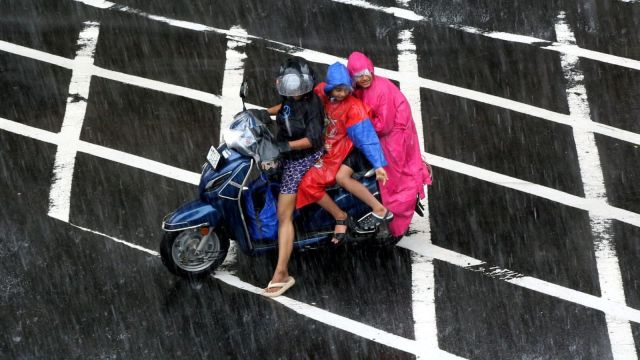Roads waterlogged, 19 incidents of tree collapse reported as Mumbai gets over 100mm rain for 3rd day in a row
According to BMC's automatic weather station data, several areas recorded 100mm throughout Saturday.
 Heavy rain in South Mumbai on Friday. (Express Photo By Ganesh Shirsekar)
Heavy rain in South Mumbai on Friday. (Express Photo By Ganesh Shirsekar)Mumbai received over 100mm of rain for the third consecutive day with the IMD’s Colaba observatory recording 111mm of rain while the Santacruz station received 79mm between Friday and Saturday morning.
According to BMC’s automatic weather station data, several areas recorded 100mm throughout Saturday.
Data showed that between 8 am and 6 pm, maximum rainfall was recorded in Sewri Koliwada (114 mm), followed by Lower Parel (112mm), Trombay (110mm) and Wadala (104mm). The IMD’s observatory recorded 52mm of rain in Santacruz and 20.6mm of rain in Colaba from 8.30 am to 5 pm on Saturday.
The IMD upgraded its forecast for the city to an orange alert by Saturday afternoon. An orange alert was also issued for Mumbai’s neighbouring districts Thane and Palghar. Raigad district had a red alert with the IMD predicting heavy to very heavy rainfall at a few places with extremely heavy rainfall at isolated places.
The IMD has issued a yellow alert for the city for Sunday, with chances of heavy rainfall at isolated places.
Several areas recorded over 100mm of rain early Saturday morning. Data from the BMC’s automatic weather station showed that maximum showers were recorded in Dindoshi, in North Mumbai, where 120mm rain was recorded between 4 am and 10 am on Saturday, followed by Mulund (119mm), Bhandup (111mm), Magathane (109 mm) as well as Malad (103.4mm).
On Saturday morning, the total stock in the seven lakes which supply water to the city soared to 40.96 per cent. This is marginally higher than the same day last year, when the lake levels touched 39.61 per cent while in 2022, the stock jumped to nearly 89 per cent.
Tulsi lake, which is the smallest of the seven lakes supplying water to the city, started overflowing on Saturday morning. When 100 per cent full, Tulsi lake has a total live storage capacity of 8,046 million litres, and it provides 18 million litres of water to the city per day.
Last year as well, civic officials said the lake started overflowing on July 20. In 2022 and 2021, it started overflowing on July 16.
Earlier this year, after the torrential downpour on July 7, Powai lake, which supplies non-potable water to Mumbai for industrial usage, started overflowing on July 8. The lake has a holding capacity of 545 crore litres and the 6.61km long catchment area gets filled during monsoon every year.
Owing to water logging, the Andheri subway was closed for traffic in the wee hours of Saturday. Subsequently, BMC operated the water pumps and made the subway operational.
Civic officials said pumps were also started at the low-lying Malad subway as well as Dahisar, Poisar, Khar and Mankhurd subways to ensure smooth traffic movement. The BEST also diverted traffic on three routes.
Besides the slab collapse in Grant Road that claimed one life and injured four others, the city recorded 19 incidents of tree collapse between 8am and 6pm on Saturday, of which the maximum incidents were recorded in the western suburbs (8), followed by island city (6) and the eastern suburbs (5). Civic officials said no injuries were reported. The city also recorded eight incidents of short circuits.








